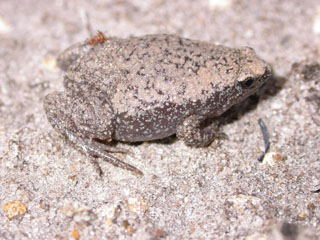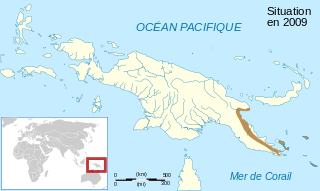
The Microhylidae, commonly known as narrow-mouthed frogs, are a geographically widespread family of frogs. The 683 species are in 57 genera and 11 subfamilies.

Cophylinae is a subfamily of microhylid frogs endemic to Madagascar. It has over 100 species in eight genera. Members of this subfamily range from minute to fairly large, and they are highly ecologically diverse. DNA barcode research has revealed a significant taxonomic gap in this subfamily, and an estimated 70+ candidate species were identified. Many of these have subsequently been described, as well as numerous new discoveries.

Stumpffia is a genus of microhylid frogs that are endemic to Madagascar. They are mostly brown frogs that typically live among leaf litter. S. contumelia has a snout–vent length of about 8–9 mm (0.31–0.35 in), making it one of the world's smallest frogs, and several others in the genus are only slightly larger. The largest species is no more than 28 mm (1.1 in).

Cophixalus is a genus of microhylid frogs. These are arboreal species with expanded toe-pads, endemic to Moluccan Islands, New Guinea and northeastern Queensland, Australia.
Ctenophryne carpish is a rare and little-known species of microhylid frogs endemic to Peru. It is known from its type locality on the Cordillera de Carpish, Huánuco, and from near Juanjuí in the San Martín Region. It lacks eardrums, and at a cursory glance it resembles leptodactylid frogs of the genus Phrynopus, in which it was initially placed.

Sphenophryne thomsoni, sometimes known as Thomson's toothless frog, is a species of frog in the family Microhylidae. It is endemic to Papua New Guinea and occurs in the southeastern peninsular New Guinea, Louisiade Archipelago, d'Entrecasteaux Islands, and Woodlark Island. It was formerly in its own monotypic genus Genyophryne. The specific name thomsoni honours Basil Thomson, a British intelligence officer, police officer, prison governor, colonial administrator, and writer.
Microhyla borneensis, also known as the Matang narrow-mouthed frog, is a species of microhylid frog found in the Matang Range in Sarawak, Borneo. It was once the smallest known frog from the Old World. Adult males of this species generally have a snout–vent length (SVL) in the range of 10.6–12.8 mm (0.42–0.50 in), but may reach a maximum of 13 mm (0.51 in). Adult females have an SVL of 16–19 mm (0.63–0.75 in). The tadpoles measure just 3 mm.

Micryletta erythropoda, commonly known as the Mada paddy frog, is a species of frog in the family Microhylidae. It is known from Myanmar, Thailand, and Vietnam. Its natural habitats are swamps, freshwater marshes, and intermittent freshwater marshes. While formerly classified in the genus Microhyla, a 2018 study found it to belong to the genus Micryletta instead. A study performed in 2019 found that several Micryletta populations in southern Myanmar and Thailand that were formerly assigned to M. inornata actually belong to M. erythropoda; prior to this, M. erythropoda was considered endemic to Vietnam.

Aphantophryne nana is a species of frog in the family Microhylidae. It is endemic to the Philippines and is known with certainty only from the island of Camiguin. It is unclear whether similar frogs from northeast Mindanao are referable to this species. It was described as Oreophryne nana, but based on molecular data it was moved to Aphantophryne in 2017. Common names Camiguin cross frog, Camiguin narrow-mouthed frog, and volcano cross frog have been coined for the species.

Sphenophryne cornuta is a species of frogs in the family Microhylidae. It is endemic to New Guinea where it is widespread and found both in the Western New Guinea (Indonesia) and Papua New Guinea. Common name horned land frog has been proposed for it.
Rhacophorus orlovi is a species of frog in the family Rhacophoridae. The species is endemic to Southeast Asia.

The Brazilian gold frog, also known as Izecksohn's toad or flea-frog, is a very small species of frogs in the family Brachycephalidae. It is endemic to southeastern Brazil and is known from the central part of the state of Rio de Janeiro and from Serra das Torres in extreme southern Espírito Santo.
AmphibiaWeb is an American non-profit website that provides information about amphibians. It is run by a group of universities working with the California Academy of Sciences: San Francisco State University, the University of California at Berkeley, University of Florida at Gainesville, and University of Texas at Austin.
Vietnamophryne is a divergent genus of Asterophryinae frogs found in Indochina. Its closest relative is the genus Siamophryne. The genus Vietnamophryne was first described by Poyarkov, et al. (2018).

Siamophryne is a genus of frog found in Thailand. It is monotypic, consisting of only one species, the Tenasserim cave frog. Its closest relative is the genus Vietnamophryne.
Vietnamophryne inexpectata is a species of microhylid frog endemic to the Central Highlands of Vietnam. Its type locality is Kon Chu Rang Nature Reserve, Gia Lai Province, central Vietnam.
Vietnamophryne occidentalis is a species of microhylid frog endemic to northern Thailand. Its type locality is Doi Tung Mountain, Chiang Rai Province, northern Thailand.
Cophixalus humicola is a species of microhylid frog endemic to the Papua Province in New Guinea. It was described by Rainer Günter in 2006.
Rhacophorus viridimaculatus, the green-spotted tree frog, is a species of frog in the family Rhacophoridae. It is endemic to Vietnam in Ha Giang Province and Tuyen Quang Province and suspected in China's Guangxi Province. It has been observed between 600 and 1300 meters above sea level.
Rhacophorus larissae, the Cao Bang tree frog, is a species of frog in the family Rhacophoridae. Scientists know it exclusively from the exactly one place: Lung Muoi in Vietnam's Cao Bang Province, approximately 1400 meters above sea level.










